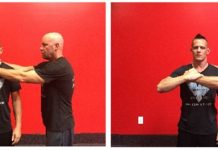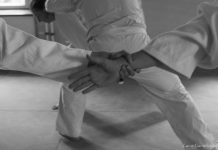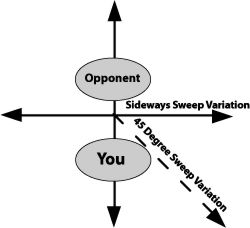
The ‘basic’ butterfly guard sweep is anything but basic. It is an extremely powerful and sophisticated attack that is difficult for your opponent to resist. In addition, this sweep has many followups and recounters, which can make life unstable and unpleasant for your opponent.
Major Sweeping Directions in the Butterfly Guard
In the butterfly guard you can sweep your opponent in every direction using different sweeps and variations. There are 4 major directions you can sweep him in:
- To your right
- To your left
- Forwards
- Backwards
In both following techniques I sweep my opponent to my right, but one variation takes him directly to the side and the other takes him over at a 45 degree angle.
There are many different sweeps and attacks from the butterfly guard, but the ‘basic’ butterfly sweep is probably the most important move. Here I discuss the two most important variations of the ‘basic’ butterfly sweep. These two variations have many similarities and a few important differences. If you are serious about developing your butterfly guard you should train both variations: depending on the situation you find yourself in you may use either sweep.
- Sweeping your opponent at 45 degrees
- Sweeping your opponent sideways
Both variations can be done from a variety of grips and positions. Here we will start in a common position: sitting upright with one arm under his arm (an ‘underhook’) and one arm over his arm (an ‘overhook’).
The following is a small portion of the curriculum from my DVD, “Dynamic Guard Sweeps”
Variation 1: Butterfly sweeping your opponent at 45 degrees
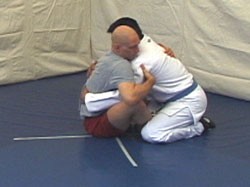 Step 1: Start in the butterfly guard with your left arm under your opponent’s arm (an ‘underhook’) and your right arm over your opponent’s arm (an ‘overhook’).
Step 1: Start in the butterfly guard with your left arm under your opponent’s arm (an ‘underhook’) and your right arm over your opponent’s arm (an ‘overhook’).
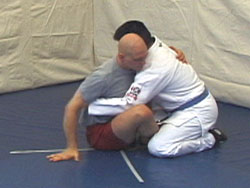 Step 2:Release your overhooking arm and place that hand on the floor behind you…
Step 2:Release your overhooking arm and place that hand on the floor behind you…
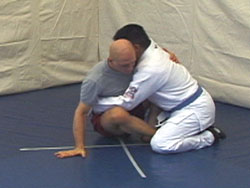
Step 2 continued: …and shift your hips to your left, away from the direction you intend to sweep him.
Note: This step allows you to shift your hips to a new angle. As you become more comfortable with this sweep you may be able to move your hips without posting your hand and/or get your opponent to move into the correct position so you don’t have to shift your hips at all.
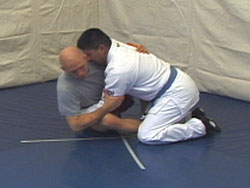
Step 3: Replace your right overhook and fall towards your right, bringing your opponent forward at a 45 degree angle…
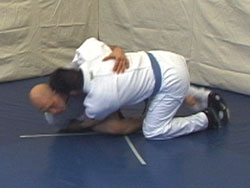
Step 3 continued: …make sure that you land on your side, and not flat on your back.
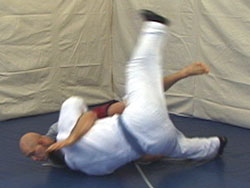
Step 4: When your shoulder hits the ground use your top (left) leg to kick your opponent’s leg into the air. Simultaneously drive off the ground with your bottom (right) leg.
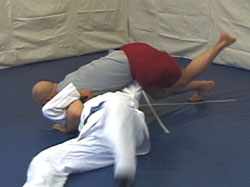 Step 5: Keeping your weight on the ball of your right foot, turn your hips…
Step 5: Keeping your weight on the ball of your right foot, turn your hips…
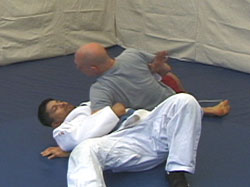 Step 5 continued: …and come to the side, pinning your opponent in a modified scarf-hold position (Kuzure Kesa Gatame in Japanese).
Step 5 continued: …and come to the side, pinning your opponent in a modified scarf-hold position (Kuzure Kesa Gatame in Japanese).
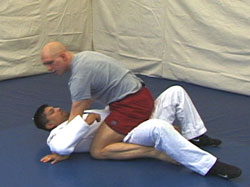 Step 5 alternative: Instead of going to the side, follow your opponent and end in the mount. Whether you go to the side or to mount depends on your preferences and the energy you feel from your opponent.
Step 5 alternative: Instead of going to the side, follow your opponent and end in the mount. Whether you go to the side or to mount depends on your preferences and the energy you feel from your opponent.
Butterfly sweeping your opponent sideways
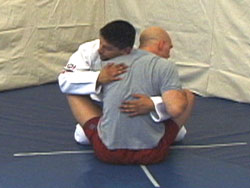 Step 1: Start in the butterfly guard with your left arm under your opponent’s arm (an ‘underhook’) and your right arm over your opponent’s arm (an ‘overhook’).
Step 1: Start in the butterfly guard with your left arm under your opponent’s arm (an ‘underhook’) and your right arm over your opponent’s arm (an ‘overhook’).
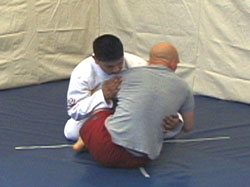 Step 2: Prepare for the sweep by moving your head down to beside his shoulder and moving your right foot to the left
Step 2: Prepare for the sweep by moving your head down to beside his shoulder and moving your right foot to the left
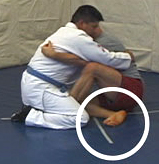 Step 2 detail: Notice how my right foot has come underneath my left leg
Step 2 detail: Notice how my right foot has come underneath my left leg
 Step 3: Drive to the side, taking your opponent with you. Maintain your right overhook to prevent him from posting his arm.
Step 3: Drive to the side, taking your opponent with you. Maintain your right overhook to prevent him from posting his arm.
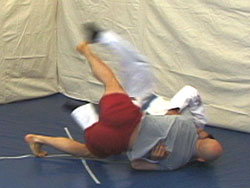 Step 4: When your shoulder hits the ground use your top leg to kick your opponent’s leg into the air (and simultaneously drive off the ground with your bottom leg).
Step 4: When your shoulder hits the ground use your top leg to kick your opponent’s leg into the air (and simultaneously drive off the ground with your bottom leg).
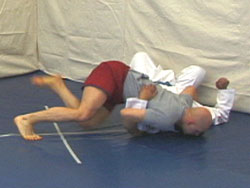 Step 5: Keeping your weight on the ball of your right foot, turn your hips…
Step 5: Keeping your weight on the ball of your right foot, turn your hips…
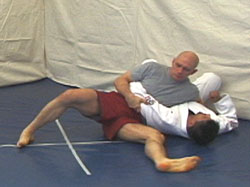 Step 5 continued: …and come to the side, pinning your opponent in a modified scarf-hold position (called Kuzure Kesa Gatame in Judo).Note: with the side-driving variation it is very difficult to come directly to the mount.
Step 5 continued: …and come to the side, pinning your opponent in a modified scarf-hold position (called Kuzure Kesa Gatame in Judo).Note: with the side-driving variation it is very difficult to come directly to the mount.



